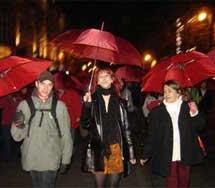Stella is acting up this December. Montreal’s only organization by and for women and trans sex workers has three important actions coming up.
On Dec 7 and 9, allies are meeting at the Montreal and Saint-Hyacinthe courthouses to support women testifying in rape trials. On Dec 17, Stella celebrates the International Day to End Violence Against Sex Workers with a march, a discussion panel (featuring trans activist Mirha-Soleil Ross), a male sex-worker band, queer DJs, readings and a show.
“The march, coupled with the panel, is a great way to become exposed to our issues and our community,” says Anna-Louise Crago, coordinator of outreach services, who notes that Stella records more than 60 attacks on Montreal’s sex workers per year.
Xtra.ca sat down with Crago to find out what can be done to stop the violence.
Xtra.ca: What prompted these actions now?
Crago: In Montreal, we have an incredibly dramatic situation. We have two alleged serial rapists going on trial who targeted sex workers. Both of them were let out on bail and we feel that that is a reflection of the way people consider violence against sex workers to be less important than violence against other people. In one case the lawyer put into question the sex workers’ credibility because they were sex workers. It’s that type of attitude and discrimination, coupled with the criminalization of sex work, that are, in fact, what create and fuel the high level of violence against sex workers.
Xtra.ca: How do you account for the apparent rise in violence against sex workers in the past few years?
Crago: We feel that the increase in violence is directly linked to criminalization and repression. Where we have seen some of the worst incidences of violence is neighbourhoods, like Hochelaga-Maisonnueve and downtown, where the police decided that they were going to massively arrest sex workers and their clients. We believe strongly that the decriminalization of sex workers saves lives of people in our community.
Xtra.ca: What would decriminalization look like?
Crago: In New Zealand, where decriminalization exists, what they have is that sex workers can easily report violence without being afraid that they’ll be arrested, without being afraid that their customers will be arrested the next day, making it difficult to earn a living. So what it means is that they’re no longer an “easy target” for perpetrators because they do actually benefit from police protection.
Xtra.ca: Tell me about the march on Dec 17.
Crago: We reach out really to the whole sex worker community. There’s going to be a trans block in the march; there’s going to be an Aboriginal women’s block in the march; there’s going to be a whole lot of people who really support us. That often comes down to the queer community, partly because a lot of us who are sex workers are queer but also because there’s a traditional alliance around being marginalized around sexuality. For some of the older queers, it’s because they remember what it was like to be criminalized for being queer, so they see the parallels for decriminalization. They also know how the anti-prostitution laws have been used to repress queer sexuality. In the past, they were used to bust bathhouses in Montreal, to bust Cox, the bar in the village in the ’90s.
Xtra.ca: What can people do to show their support?
It would be so amazing for us to have as many people as possible come out on Dec 17. It’s been a very scary fall at Stella. As we were awaiting trials for these two serial rapists, there was an attempted murder, sequestration, extreme violence that we’ve seen. We feel like we’re a bit at a tipping point and we really need as many people to rally and support so that we can stop the wave of violence that’s happening right now. We would love, love, love for people to come out. People can just come out as individuals, but it’s also neat to have the visibility of people from the queer community.
For more information, see chezstella.org, or call Stella at 514-285-1599.

 Why you can trust Xtra
Why you can trust Xtra


